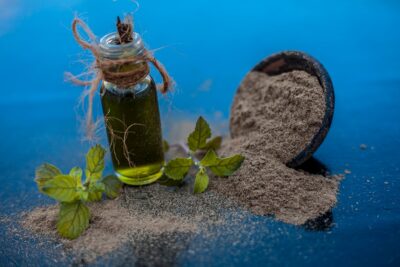A hypothetical candidate for the original soma plant of the Vedas, Bacopa monnieri (in Sanskrit sarasvati or “that which flows”), is a medicinal and nootropic plant named after Saraswati, the Hindu goddess of knowledge, music, art, wisdom, and learning.
This plant is used mainly to enhance cognition and memory and as an anxiolytic.
Bacopa is also known as:
- Brahmi
- Jalabrahmi
- Water hyssop
- Herb of grace
- Mandukaparni
- Indian pennywort
- Bacopa monniera
- Graticola monnieri
- Monniera cuneifolia
- Herpestris monniera
- Lysimachia monnieri
- Thyme-leafed gratiola
Traditional Uses
While the constituents of Bacopa monnieri have no known psychoactive effects, the leaves are the primary ingredient of Brahmi Rasayan, an Ayurvedic nerve tonic that does exert an effect upon the brain.
The leaves, stems, and flowers of Bacopa monnieri have been used in Ayurvedic traditional medicine for thousands of years to improve memory and reduce anxiety. Texts from the 6th century BC mention using bacopa for boosting cognitive function and treating mental disorders. It is normal to give bacopa teas and syrups to children in India to enhance their mental and intellectual abilities.
Other medicinal uses in Ayurveda:
- Blood purifier
- Treatment for asthma
- An aid to healthy heart and lung function
- Remedy for diarrhea, bronchitis, and fevers
- Juice from the leaves is applied externally to inflamed joints for pain relief
Western herbalists are beginning to recognize that bacopa is an anxiety-relieving herb, which may also improve cognitive functions, including learning, comprehension, memory, and attention span.
An Adaptogen
Bacopa is an adaptogen (also known as rasayana in Ayurveda, qi tonic in Chinese medicine, or rejuvenating herb), and as such it may have the following powers:
- promote wellness by strengthening the body’s ability to heal itself
- increase the body’s resistance and help it “adapt” to physical and mental stress resulting from infection, trauma, anxiety, fatigue, heat or cold, exertion, sleep deprivation, over-work, strained personal relationships, pivotal life events, psychological duress, exposure to toxic substances or radiation, etc.
- restore balance in all of the body’s systems
- enhance mental function and perception
- normalize body systems and functions
- foster healing of the body as a whole
- strengthen the immune response
What does the science say?
Scientific research found that Bacopa monnieri may indeed improve cognition. It appears to help people process visual information quickly, learn faster, and consolidate new material into memory an learning by relieving anxiety, as well as by enhancing nerve impulse transmission, which in turn improves cognitive functions.
In modern Western herbal medicine, it has the following uses:
- improve cognitive functions, such as focus, attention span, concentration, and memory, including recall of newly acquired information
- prevent stress
- relieve tension
- a potential cognitive aid for the elderly
- mild anxiolytic – at the time of writing, this was based on animal research
- mild antidepressant, promoting emotional well-being, physical endurance, and a healthy immune system
Constituents
Bacopa contains constituents, which are lipophilic, meaning they are able to cross the blood brain barrier and affect the brain. Some of bacopa’s constituents are:
- the glycoside asiaticoside
- bacoside A and bacoside B – triterpenoid saponins which help animals remember tasks and to reverse the memory loss that occurs with certain medications
- other saponins (bacopasides I–XII)
- the alkaloids brahmine, nicotine, and herpestine
Dreaming
My main interest in Bacopa monnieri is as a dream herb. Many people report having intense and vivid dreams under its influence to the point of nightmares.
For example, one person started taking one 250 mg pill standardized to 45% bacosides in the morning reported “every night since I started taking it, I’ve been having dreams constantly and relatively vividly every time I fall asleep.” Another person wrote: “I tried taking it at night but it made my dreams uncomfortably vivid.”
Others reported having vivid nightmares throughout the night after taking bacopa. One person had to stop taking bacopa. He was using a supplement standardized to 50% bacosides. Here is an excerpt from his report:
It gave me deep, uninterrupted sleep all the way through, but yes, also gave me vivid nightmares and dreams that I could recall easily upon waking. The reason I stopped it though is because when I woke up, I would just be lazy all day… not so much groggy, but more unmotivated and fatigued. I feel like the serotonergic and anti-dopaminergic effects were very prevalent for me… I had less anxiety and stress about trivial things but was also just more dull.
Lucid Dreaming
Whether bacopa actually makes dreams more vivid or simply improves one’s dream recall, it may be a useful lucid dreaming supplement.
One of the explanations regarding how bacopa works is that it affects levels and metabolism of the neurotransmitter acetylcholine in the brain. Acetylcholine is involved in arousal, attention, memory, and motivation.
Many lucid dreaming supplements, such as choline and galantamine, work by boosting acetylcholine levels in the brain right before going to sleep, resulting in a sleep that is lighter as if some part of you is still awake, watching, with more REM sleep (the stage of sleep where most dreaming occurs).
One of the most important conditions for having a lucid dream is remembering dreams. Otherwise, you may be lucid in every dream, and each time forget all about it. Anecdotal evidence points that bacopa may indeed improve dream recall. One person for example reports:
I used to never be able to remember my dreams when I woke up. In other words, I personally felt as if I “didn’t dream much ever.” First night after taking Bacopa, I dreamed and REMEMBERED IT. Since taking it regularly, I have dreams that I remember almost every night.
However, bacopa apparently does more to lucid dreaming than just help with dream recall, especially when combined with other acetylcholine boosters, such as choline, and with a lucid dreaming induction method, such as the WILD (Wake-Initiated Lucid Dream) method. One person reports:
I had a couple successes with it that I initially attributed to a placebo effect, but after another effective WILD attempt I’m starting to wonder if it is more than that. The last two attempts have been during structured WBTBs and both resulted in WILDs. On both occasions I took […] Bacopa together with tablets of Choline […] despite the shallowness of the dream state I was able to resume LD multiple times by way of WILD and DILD for over an hour.
Sleep Herb
As a nervine, Bacopa may also be useful as a sleep-promoting herb. Indeed, insomnia, especially when accompanied or caused by anxiety or stress, was treated with bacopa in traditional Ayurvedic medicine.
Bacopa may induce a state of relaxation, which may make it easier to fall asleep. In larger doses, it may even cause drowsiness.
Ancedotal evidence suggest that bacopa helps them with stress relief and sleep, but that they often don’t feel refreshed after a bacopa-induced sleep.
Dosage
- Capsules – up to 5-10 grams per day of powdered bacopa
- Tea – up to 1-2 teaspoons of bacopa leaves steeped in 1 cup of water for 5-10 minutes (up to 3 times daily)
- Tincture – up to 1-2 teaspoons of tincture per day
- Syrup – up to 2 tablespoons daily
- Extract – up to 150 mg twice daily of a standardized extract with 20-55% bacosides.
While bacopa must be taken for at least 4-6 weeks for its cognitive effects to fully manifest, in studies which found benefit, 300 mg in capsules (150 mg twice per day) of bacopa extract were given for 3 months.
According to anecdotal evidence, 750 mg may make you drowsy, and may be a sleep dose. For an anxiolytic and nervine effect, there’s no need to take the herb for weeks. Just take it whenever you need it.
To minimize or avoid adverse effects, start with a low dose and increase over time, if needed.
Also, do not take bacopa on an empty stomach. Eat something beforehand, preferably a food with some fat such as an avocado or a handful of nuts.
Do not combine bacopa with other medications, especially sedatives and thyroid medications.
Adverse Effects
Bacopa appears to be both safe and well-tolerated. It has a long history of use, even among children. Side effects are not common and may include:
- gastrointestinal effects, including nausea, cramping, bloating, diarrhea, increased intestinal motility, and gastrointestinal upset
- fatigue, grogginess, and drowsiness
- slow heart rate (bradycardia)
- dry mouth
Consult with a physician if you’re pregnant, breast-feeding, or if you’re suffering from any disorders, especially gastrointestinal, lung, urinary, and thyroid disorders.
One of the most interesting side effects of Bacopa monnieri is apathy and lack of motivation. One person describes it:
I’m completely careless to everything and my motivation to do things is very little. But when I start doing things, I don’t want to stop. It’s had a profound effect on my attention. I don’t know if the attention is because of the apathy or something but attention is another aspect that I like about Bacopa. Also due to the apathy, my anxiety is also very minimal in any situation.
This might be problematic, and not just if lucidity is your goal. As one lucid dreamer wrote:
The results are entirely consistent: much improved sleep, a LOT more dreams, and a complete loss of motivation during sleep. You may well ask, who cares about motivation during sleep? Well, I and all other lucid dreamers do, since we want to become lucid during dreams. This makes Bacopa quite frustrating for me: it engenders many more vivid dreams, which would be the perfect situation for attaining lucidity, but at the same time it completely destroys my desire to obtain said lucidity.
Procuring Bacopa monnieri nootropic
Most of the world’s bacopa supply is wild-harvested in India, or planted near waterways for ease of harvesting.
An extract is made from the whole plant and then sold to botanical markets throughout the world.
Check Availability (Amazon.com)



